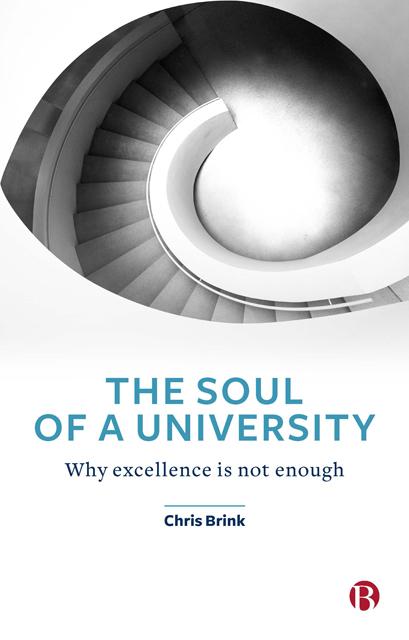Book contents
- Frontmatter
- Miscellenous Frontmatter
- Dedication
- Miscellenous Frontmatter
- Contents
- List of Illustrations
- List of Abbreviations
- Acknowledgements
- Prologue
- Introduction
- 1 The Standard Model University
- 2 Rankings and League Tables
- 3 Quality in Higher Education
- 4 Tales of Quality, Equality and Diversity
- 5 Rank Order of Worth
- 6 Linear Thinking
- 7 Another Dimension
- 8 Ideas of a Civic University
- Epilogue On the Supreme Good, by Boethius of Dacia
- Notes
- Index
- Frontmatter
- Miscellenous Frontmatter
- Dedication
- Miscellenous Frontmatter
- Contents
- List of Illustrations
- List of Abbreviations
- Acknowledgements
- Prologue
- Introduction
- 1 The Standard Model University
- 2 Rankings and League Tables
- 3 Quality in Higher Education
- 4 Tales of Quality, Equality and Diversity
- 5 Rank Order of Worth
- 6 Linear Thinking
- 7 Another Dimension
- 8 Ideas of a Civic University
- Epilogue On the Supreme Good, by Boethius of Dacia
- Notes
- Index
Summary
The idea of the ladder
We are for the ladder. Let all try their best to climb.
Winston Churchill
Rankings and league tables, quality as a positional good, meritocracy as rank order of worth, society stratified into classes, hierarchy instead of diversity – what do these phenomena have in common? They are all linear representations. They compress reality into a ranked list, in which higher up means better and lower down means worse. They encourage us to fall into line. When we do, we acknowledge that the ranking, the list, the line-up, is an order of esteem. It is also called the ladder of success.
The idea of the ladder is strong, and promoted in many ways, particularly by those positioned on the highest rungs. Consider, for example, the case of Winston Churchill. Without detracting from our admiration for the great man, we may note that his career rather neatly illustrates Somerset Maugham’s maxim that the ladder of success is more easily climbed when merit has the helping hand of influence.
The young Winston had illustrious family connections. His father was Lord Randolph Churchill, a younger son of the 7th Duke of Marlborough. The 1st Duke of Marlborough started life as just plain John Churchill, son of a minor squire called Sir Winston Churchill. This John Churchill played a key part in the Glorious Revolution of 1688, and turned out to be a soldier of genius. He repeatedly defeated the allied forces of the Sun King Louis XIV, most famously at the Battle of Blenheim in 1704. In grateful appreciation, Queen Anne and Parliament awarded him a dukedom, a perpetual pension of £5,000, and a vast stately home called Blenheim Palace, which you can still visit at Woodstock in Oxfordshire. This is where the later Winston Churchill was born, in 1874. The 8th Duke, Lord Randolph’s elder brother, died young, and was succeeded as the 9th Duke by his son, Winston’s cousin and contemporary, called ‘Sunny’ after his courtesy birth title of the Earl of Sunderland.
Winston Churchill did have family advantages, of course, and was determined to capitalise upon them. His parents’ connections gave him immediate access to everyone who counted in the hierarchical society of the day.
- Type
- Chapter
- Information
- The Soul of a UniversityWhy Excellence Is Not Enough, pp. 227 - 254Publisher: Bristol University PressPrint publication year: 2018



